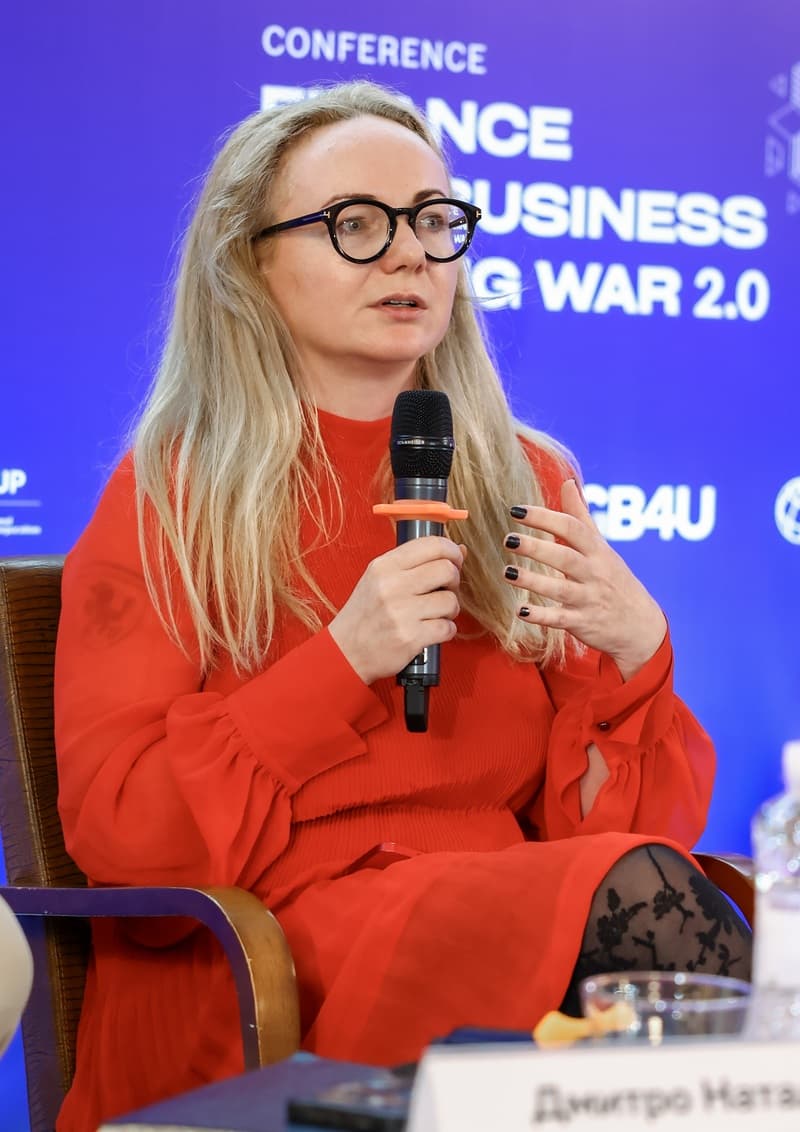The European Business Association organised the conference “Finance for Business during War 2.0”, which took place in Kyiv. The event brought together the representatives from banking sector, business, and government agencies to discuss the financial solutions needed to promote economic resilience and recovery. Particular attention was paid to supporting frontline regions and those affected by the war. Vira Savchenko, the CEO of BDO in Ukraine, has participated in the discussions.

Volodymyr Mudryi, Chairman of the NABU Council, welcomed the participants and highlighted the positive trends in the lending market. He announced that the corporate portfolio had grown by 28% and that loans to small and medium-sized businesses now accounted for over 60% of the total. However, he also underscored several challenges, including the fact that the loan portfolio accounts for only 19% of GDP, and that the issue of war risk insurance remains unresolved. New ideas and joint solutions are required to overcome these issues.
The conference programme included two panel discussions. The first was dedicated to the regulatory environment and regional risk mitigation instruments as catalysts for business financing in Ukraine. Speakers discussed the legal framework, as well as planned legislative changes, financial stability, war risk insurance role in accessing finance, and investment insurance mechanisms and instruments.
The second panel discussion focused on business lending during wartime. Participants discussed the financial services market’s current offerings for financing recovery projects and the need for loan and grant products for businesses, as well as government business support programmes.
Danylo Hetmantsev, Ukrainian Parliament Member, Chairman of the Verkhovna Rada Committee on Finance, Taxation and Customs Policy, stressed that the draft law on war risk insurance is currently being developed based on feedback from business associations. He also emphasised the importance of upholding the rule of law and creating an equal conditions for businesses, and highlighted the positive lending dynamics observed in the first quarter of 2025.
Dmytro Natalukha, Ukrainian Parliament Member, Chairman of the Verkhovna Rada Committee on Economic Development, stressed the importance of supporting businesses in frontline regions as a matter of national security. He also highlighted issues with access to finance and discussed adapting European approaches to Ukrainian realities. He added that a vote on the Law on Public-Private Partnerships is expected.
Kateryna Rozhkova, First Deputy Governor of the National Bank of Ukraine, spoke about the NBU’s work on the specifics of banks’ assessment of credit risk on specialised loans, the revival of lending in various industries and increased collateral liquidity ratios.
Andrii Fita, JTI Ukraine‘s Deputy CEO for Corporate Affairs and Communications, stressed that the business’s main priorities are people’s safety, sustainable processes and reliable partnerships with the state. He also noted that businesses expect stable and predictable fiscal policies, as well as effective action against the illegal market for excisable goods.
 Vira Savchenko, the CEO of BDO in Ukraine and Co-Chair of the EBA Committee on Ukraine’s Recovery, noted that the EBA has set up a committee to represent the collective views of its members and the business community. This committee regularly surveys and consults with the business community. According to Vira Savchenko, Ukraine is currently dealing with several key issues.
Vira Savchenko, the CEO of BDO in Ukraine and Co-Chair of the EBA Committee on Ukraine’s Recovery, noted that the EBA has set up a committee to represent the collective views of its members and the business community. This committee regularly surveys and consults with the business community. According to Vira Savchenko, Ukraine is currently dealing with several key issues.First, it is access to information. Currently, there is no complete information on all the financing instruments available to Ukrainian entrepreneurs and government agencies. This issue is extremely relevant given that many European programmes, such as EU for Business, grant programmes, Horizon and the Ukraine Facility, are becoming available to Ukraine.
Secondly, the difficulty of obtaining financing. To address this, the committee has proposed two strategies: facilitating some of the requirements for programme participants and providing technical assistance in preparing the necessary documents.
Various project preparation facilities are currently being created to address this problem and work with both private and public projects. One such facility is the Investment Opportunity Map, which is being developed jointly with Ukraine Invest to support projects in Ukraine. This tool enables projects to be plotted on a map and provides guidance on securing funding.
However, Vira Savchenko noted that these initiatives are merely a “drop in the ocean”, as the problem remains highly relevant and is becoming increasingly acute, particularly in frontline regions. She emphasised the need for all regions, especially those most affected by the hostilities, to have access to financial resources to support their economic recovery and development:
“The challenges faced by the business are exacerbated in frontline regions. Access to financing is critical, with businesses reporting that they lack full information about the support tools available to them. We held meetings where we identified the main problems faced by different stakeholders. A unified system of access to information is necessary, as the existing funding requirements are unclear and complicated, especially for small and medium-sized enterprises.”

Changes to the 5-7-9 programme
Andrii Gapon, the Executive Director of the Business Development Fund, gave a presentation on key aspects of state and international business support in Ukraine. He noted that the boundaries between state and international support have recently become more blurred, enabling the banking sector to prepare itself more effectively to attract foreign funds.Particular attention was paid to the 5-7-9 programme, an anti-crisis initiative developed during the pandemic. According to Andrii Gapon, 2025 will be a pivotal year for this programme. Recent changes by the Cabinet of Ministers mean that the programme will return to investment planning, but its budget will be reduced. Nevertheless, since its inception, the programme has issued UAH 39 billion in loans to the agricultural, manufacturing and other sectors, and its current portfolio stands at UAH 121 billion.
The 5-7-9 programme is being gradually phased out and transformed into a more sector-specific instrument. To compensate for this, the Entrepreneurship Development Fund has launched 17 new programmes to support businesses. The importance of targeted support for women- and veteran-owned businesses was also emphasised.
Supporting exporters in times of war: ECA’s experience
Ruslan Gashev, Chairman of the Export Credit Agency (ECA) Board, explained how the war has affected lending to exporters. He noted that exporters are quality borrowers. The war has had a positive impact on the development of the ECA. From the ECA’s establishment in 2018 until 2021, the volume of supported exports was around UAH 100 million. Over the next 3.5 years, however, this figure increased to approximately UAH 24.5 billion. This growth is enormous, even though the capital remained the same at UAH 2 billion. This has enabled us to demonstrate to the government, the Ministry of Economy and the Ministry of Finance that using UAH 1 of the company’s capital leads to future export revenues of approximately UAH 9.5. This helps clients who have problems with collateral, i.e. financing.Typically, there is no national insurance against war risks anywhere in the world. This product was developed in collaboration with the EBA and NEXI, the Japanese export credit agency. Now, we insure not only share capital, but also equity, against military and political factors. Ruslan also emphasised:
“The number of potential consumers in Ukraine has fallen. If a company does not want to lose its position in foreign markets or compensate for the loss of the domestic market at the expense of foreign markets, entering foreign markets is the only option. Ukrainian products are of a very high quality, which is why food makes up the TOP-5 of our export portfolio. We are ready to help exporters secure financing to expand into foreign markets. Most importantly, the ECA has the tools to verify foreign companies and detect fraud.”
Conclusions
At the “Finance for Business in Times of War 2.0” conference, the critical importance of access to finance for business recovery was confirmed, particularly in frontline regions. In her speech, Vira Savchenko emphasised the need to simplify access to information on financial support and instruments for small and medium-sized enterprises. Discussions of programmes such as war risk insurance and export credit revealed their positive impact on the economy. Changes to the 5-7-9 programme and other initiatives are expected to promote the development of various sectors, including women’s and veteran-owned businesses. Collaboration between governments, businesses, and international partners is essential for the successful recovery of Ukraine’s economy. Overall, a significant step is to introduce transparent financial support mechanisms for businesses in times of war.A video of the conference is available at here.
BDO in Ukraine offers a wide range of financial and advisory services to help businesses adapt to new economic realities. Our experts are ready to support you in optimising your financial processes, developing effective strategies, and ensuring you have access to the necessary resources. Thanks to our many years of experience, we have helped businesses in various sectors to grow, even in difficult conditions. Contact BDO in Ukraine today to find out how we can support your business and provide you with tailored solutions to help you achieve success.
